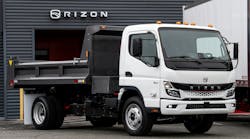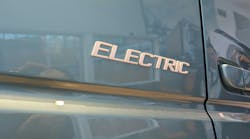New England-based Braun's Express is running battery-powered auxiliary power units (APUs) in its long-haul trucks and has them fitted for shore power at its own terminals, but is looking ahead to when plug-in AC power is common at truck stops.
The LTL carrier provides service in a territory stretching from Maine to Virginia. Founded in 1930, it runs 120 power units and 300 trailers and has four terminals in the Northeast along with one in Georgia. The company has been honored by the U.S. Environmental Protection Agency (EPA) with a regional Environmental Merit Award. EPA recognized Braun's for joining its SmartWay program at its 2004 inception because it takes “full advantage of the strategies and technologies offered and shares its successes to bring New England peers to a higher level of environmental professionalism.”
EPA noted, too, that Braun's has “sought, evaluated and adopted cutting-edge technology, such as APUs, aerodynamic tractor and trailer features [for reduced wind drag] and single-wide tires with aluminum rims and automatic tire inflation devices [for reduced rolling resistance] on select trucks.”
One of the company's specialties is complete supply-chain management for carpeting and flooring products. Braun's picks up products from carpet mills in the South, consolidates them at its Dalton, GA, facility and sends them north for delivery.
A NICE RESTING SPOT
Given this routing scheme, the carrier has found Virginia the logical place for its long-haul drivers to spend their 10-hour breaks. As it does get hot there in the summer, Stephen Normandin, Braun's director of strategic initiatives, points out all the company's long-haul power units are equipped with battery-powered APUs for running both heaters and air conditioning.
Normandin says Braun's chose battery-powered APUs over diesel-powered units because of the reduced maintenance and also because of the restrictions placed on diesel APUs by anti-idling and emissions rules. He believes improvements in battery technology will eventually make battery-powered HVAC systems a mainstream product.
“I think it's the future,” he says. “But what we'd like to see is the battery-powered system working in concert with AC power at truck stops. Then you have the best of both worlds — an onboard system that can work solo on battery power or one that can be tied into the grid. Once on shore power, AC power runs the entire unit, plus recharges our batteries. So it's good for the batteries' health, plus our guys get full HVAC comfort and all the conveniences of AC power to run their laptops, microwaves and TVs.
“That's why I'm interested in the broad deployment of shore power technology,” he continues. “All of our long-haul power units are equipped with shore power connections, and they're plugged in when they're at our terminals. But so far the technology isn't available in Virginia where we spend a lot of truck stop time.”
LOOKING FOR ANSWERS
“It would be nice to be able to offer our drivers the option of going to a truck stop with electric pedestals,” says Normandin. “Our company could cover the cost for usage, keep the drivers happy, and get them to use the system for the full 10 hours and not rely on battery power, or have to idle if the batteries wear down. We'd love it if we could offer them that option in Virginia, Georgia, and Massachusetts — everywhere they take their break.”
When a Braun truck is not idling, Normandin says they save as much as $45 a night. “From tracking fuel-consumption data, we know we save a huge amount of fuel. Complementing the APUs with shore power would get these systems working to their full potential.”
Drivers are aware of the potential gains from having an alternative to idling because they have a direct stake in cutting fuel consumption. “We post rankings of all of our drivers by miles per gallon,” Normandin relates. “One driver told me, ‘I want to be at the top of that list, but sometimes my APU doesn't last and then I have to override the system and it's dropping me down on my ranking.’
“We want to save the money, but we want to keep the drivers happy,” says Normandin. “Having shore power available on the road will help us accomplish both of those goals.”


